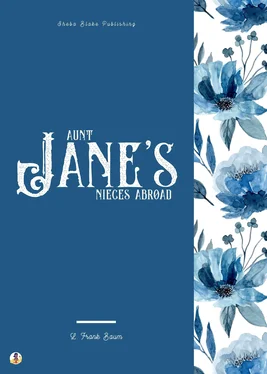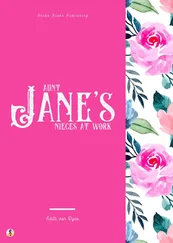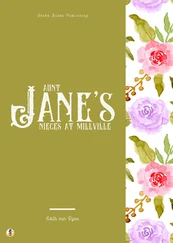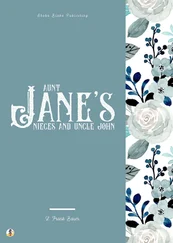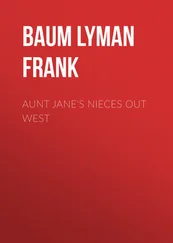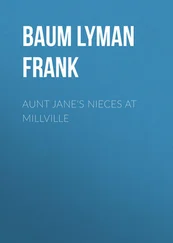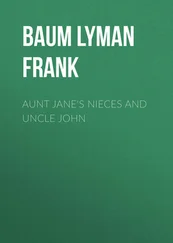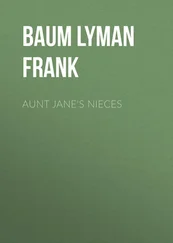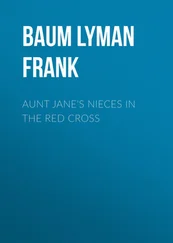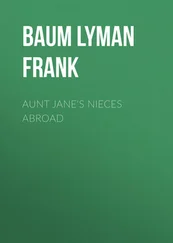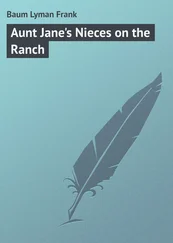L. Frank Baum - Aunt Jane's Nieces Abroad
Здесь есть возможность читать онлайн «L. Frank Baum - Aunt Jane's Nieces Abroad» — ознакомительный отрывок электронной книги совершенно бесплатно, а после прочтения отрывка купить полную версию. В некоторых случаях можно слушать аудио, скачать через торрент в формате fb2 и присутствует краткое содержание. Жанр: unrecognised, на английском языке. Описание произведения, (предисловие) а так же отзывы посетителей доступны на портале библиотеки ЛибКат.
- Название:Aunt Jane's Nieces Abroad
- Автор:
- Жанр:
- Год:неизвестен
- ISBN:нет данных
- Рейтинг книги:4 / 5. Голосов: 1
-
Избранное:Добавить в избранное
- Отзывы:
-
Ваша оценка:
- 80
- 1
- 2
- 3
- 4
- 5
Aunt Jane's Nieces Abroad: краткое содержание, описание и аннотация
Предлагаем к чтению аннотацию, описание, краткое содержание или предисловие (зависит от того, что написал сам автор книги «Aunt Jane's Nieces Abroad»). Если вы не нашли необходимую информацию о книге — напишите в комментариях, мы постараемся отыскать её.
Aunt Jane's Nieces Abroad — читать онлайн ознакомительный отрывок
Ниже представлен текст книги, разбитый по страницам. Система сохранения места последней прочитанной страницы, позволяет с удобством читать онлайн бесплатно книгу «Aunt Jane's Nieces Abroad», без необходимости каждый раз заново искать на чём Вы остановились. Поставьте закладку, и сможете в любой момент перейти на страницу, на которой закончили чтение.
Интервал:
Закладка:
“I will.”
“And to-morrow you must see Louise,” added Patsy. “I’m not sure she’ll want to go, dear. She’s such a social butterfly, you know, that her engagements may keep her at home.”
“Do you mean to say she’s engaged?” asked Mr. Merrick, aghast.
“Only for the parties and receptions, Uncle. But it wouldn’t surprise me if she was married soon. She’s older than Beth or me, and has a host of admirers.”
“Perhaps she’s old enough to be sensible,” suggested the Major.
“Well, I’ll see her and her mother to-morrow morning,” decided Uncle John, “and if she can’t find time for a trip to Europe at my expense, you and Beth shall go anyhow—and we’ll bring Louise a wedding present.”
With this declaration he took his hat and walking stick and started for the telegraph station, leaving Patsy and her father to canvass the unexpected situation.
John Merrick was sixty years old, but as hale and rugged as a boy of twenty. He had made his vast fortune on the Pacific Coast and during his years of busy activity had been practically forgotten by the Eastern members of his family, who never had credited him with sufficient ability to earn more than a precarious livelihood. But the man was shrewd enough in a business way, although simple almost to childishness in many other matters. When he returned, quite unheralded, to end his days “at home” and employ his ample wealth to the best advantage, he for a time kept his success a secret, and so learned much of the dispositions and personal characteristics of his three nieces.
They were at that time visiting his unmarried sister, Jane, at her estate at Elmhurst, whither they had been invited for the first time; and in the race for Aunt Jane’s fortune he watched the three girls carefully and found much to admire in each one of them. Patsy Doyle, however, proved exceptionally frank and genuine, and when Aunt Jane at last died and it was found she had no estate to bequeath, Patsy proved the one bright star in the firmament of disappointment. Supposing Uncle John to be poor, she insisted upon carrying him to New York with her and sharing with him the humble tenement room in which she lived with her father—a retired veteran who helped pay the family expenses by keeping books for a mercantile firm, while Patsy worked in a hair-dresser’s shop.
It was now that Uncle John proved a modern fairy godfather to Aunt Jane’s nieces—who were likewise his own nieces. The three girls had little in common except their poverty, Elizabeth De Graf being the daughter of a music teacher, in Cloverton, Ohio, while Louise Merrick lived with her widowed mother in a social atmosphere of the second class in New York, where the two women frankly intrigued to ensnare for Louise a husband who had sufficient means to ensure both mother and daughter a comfortable home. In spite of this worldly and unlovely ambition, which their circumstances might partially excuse, Louise, who was but seventeen, had many good and womanly qualities, could they have been developed in an atmosphere uninfluenced by the schemes of her vain and selfish mother.
Uncle John, casting aside the mask of poverty, came to the relief of all three girls. He settled the incomes of substantial sums of money upon both Beth and Louise, making them practically independent. For Patsy he bought a handsome modern flat building located at 3708 Willing Square, and installed her and the Major in its cosiest apartment, the rents of the remaining flats giving the Doyles an adequate income for all time to come. Here Uncle John, believing himself cordially welcome, as indeed he was, made his own home, and it required no shrewd guessing to arrive at the conclusion that little Patsy was destined to inherit some day all his millions.
The great banking and brokerage firm of Isham, Marvin & Co. had long managed successfully John Merrick’s vast fortune, and at his solicitation it gave Major Doyle a responsible position in its main office, with a salary that rendered him independent of his daughter’s suddenly acquired wealth and made him proud and self-respecting.
Money had no power to change the nature of the Doyles. The Major remained the same simple, honest, courteous yet brusque old warrior who had won Uncle John’s love as a hard working book-keeper; and Patsy’s bright and sunny disposition had certain power to cheer any home, whether located in a palace or a hovel.
Never before in his life had Uncle John been so supremely happy, and never before had Aunt Jane’s three nieces had so many advantages and pleasures. It was to confer still further benefits upon these girls that their eccentric uncle had planned this unexpected European trip.
His telegram to Elizabeth was characteristic:
“Patsy, Louise and I sail for Europe next Tuesday. Will you join us as my guest? If so, take first train to New York, where I will look after your outfit. Answer immediately.”
That was a message likely to surprise a country girl, but it did not strike John Merrick as in any way extraordinary. He thought he could depend upon Beth. She would be as eager to go as he was to have her, and when he had paid for the telegram he dismissed the matter from further thought.
Next morning Patsy reminded him that instead of going down town he must personally notify Louise Merrick of the proposed trip; so he took a cross-town line and arrived at the Merrick’s home at nine o’clock.
Mrs. Merrick was in a morning wrapper, sipping her coffee in an upper room. But she could not deny herself to Uncle John, her dead husband’s brother and her only daughter’s benefactor (which meant indirectly her own benefactor), so she ordered the maid to show him up at once.
“Louise is still sweetly sleeping,” she said, “and won’t waken for hours yet.”
“Is anything wrong with her?” he asked, anxiously.
“Oh, dear, no! but everyone does not get up with the milkman, as you do, John; and the dear child was at the opera last night, which made her late in getting home.”
“Doesn’t the opera let out before midnight, the same as the theatres?” he asked.
“I believe so; but there is the supper, afterward, you know.”
“Ah, yes,” he returned, thoughtfully. “I’ve always noticed that the opera makes folks desperately hungry, for they flock to the restaurants as soon as they can get away. Singular, isn’t it?”
“Why, I never thought of it in that light.”
“But Louise is well?”
“Quite well, thank you.”
“That’s a great relief, for I’m going to take her to Europe with me next week,” he said.
Mrs. Merrick was so astonished that she nearly dropped her coffee-cup and could make no better reply than to stare blankly at her brother-in-law.
“We sail Tuesday,” continued Uncle John, “and you must have my niece ready in time and deliver her on board the ‘Princess Irene’ at Hoboken at nine o’clock, sharp.”
“But John—John!” gasped Mrs. Merrick, feebly, “it will take a month, at least, to make her gowns, and—”
“Stuff and rubbish!” he growled. “That shows, Martha, how little you know about European trips. No one makes gowns to go abroad with; you buy ‘em in Paris to bring home.”
“Ah, yes; to be sure,” she muttered. “Perhaps, then, it can be done, if Louise, has no other engagements.”
“Just what Patsy said. See here, Martha, do you imagine that any girl who is half human could have engagements that would keep her from Europe?”
“But the requirements of society—”
“You’ll get me riled, pretty soon, Martha; and if you do you’ll wish you hadn’t.”
This speech frightened the woman. It wouldn’t do to provoke Uncle John, however unreasonable he happened to be. So she said, meekly:
“I’ve no doubt Louise will be delighted to go, and so will I.”
Читать дальшеИнтервал:
Закладка:
Похожие книги на «Aunt Jane's Nieces Abroad»
Представляем Вашему вниманию похожие книги на «Aunt Jane's Nieces Abroad» списком для выбора. Мы отобрали схожую по названию и смыслу литературу в надежде предоставить читателям больше вариантов отыскать новые, интересные, ещё непрочитанные произведения.
Обсуждение, отзывы о книге «Aunt Jane's Nieces Abroad» и просто собственные мнения читателей. Оставьте ваши комментарии, напишите, что Вы думаете о произведении, его смысле или главных героях. Укажите что конкретно понравилось, а что нет, и почему Вы так считаете.
